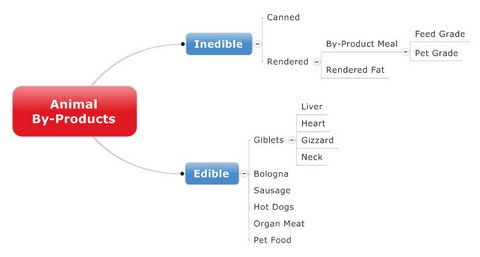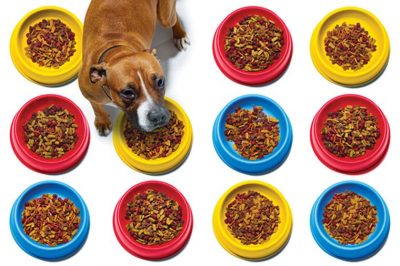Is pet food for pets or profit?

“The pet food industry wasn’t created to offer our pets wholesome nutrition. It was created to turn waste into profit.”
This statement may shock you, but the pet food industry wasn’t invented to offer our pets wholesome nutrition. It was invented to dispose of waste from human food production.
If a part of an animal can be sold for human consumption it will be. If it’s not fit for human consumption, or if it’s past it’s use by date, rank, or worse, then it’s used for animal feed or pet food. It’s a much more convenient way of disposing of waste and making profit in the process. That’s what you’d call a Win-Win situation, but it’s a Win-Win for the company and not your furry family member.
Here’s a diagram showing what happens with meat by-products (the bits left over after the decent bits are removed):

* image sourced from www.dogfoodadvisor.com
This isn’t only about meat in a pet food, but most other ingredients as well. Have a look at your expensive scientific prescription food as recommended by your vet, you may find the first or second ingredient to be something called “brewers rice”. Wikipedia describes this as “a brewery waste product”. Yes, that’s right folks, you’re forking out a premium price for your pets health, and what you’re actually buying is a product full of waste products.
“But my vet recommended the food” I hear you say! How can this be? Why would a vet recommend I feed my sick kitty a food made of waste products? It just doesn’t make sense!
You might be interested to learn pet nutrition isn’t covered in depth on a veterinary course. To become a Bachelor of Veterinary Science (BVSc) a student will study nutrition for what amounts to hours.
Interestingly, the University of Sydney has come under fire this week regarding corporate sponsorship and influence from Hills and Royal Canin, two brands recommended by vets. The sponsorship deals were not widely publicised, instead being kept quiet as much as possible. An article on ABC News (here) discusses how a professor at the university has spoken out about the inherent issues of corporate sponsorship, but suffered blow-back from senior staff members by doing so.
So what are the inherent problems, and why are they significant?
A pet food manufacturer has a primary goal – to sell their product. What better way to sell a product than train our vets to sell it for them?
The sponsorship deals at University of Sydney give the corporation influence on what research is conducted, as well as subsidised pet food for students, free lab gear, and so forth. Similar sponsorships at other universities include tours of manufacturing facilities and curriculum material provided by the manufacturers themselves. This material is designed to sell a product, not teach pet nutrition.
If you’re still confused why a vet would recommend a food made from waste products, let me give you a simple reason:
A cat or dog is suffering kidney disease. Scientific research tells us a diet with reduced protein and phosphorous is required. The pet food manufacturer sponsoring the university has a specifically formulated prescription diet for this condition, which will be the recommended diet.
A number of factors are conveniently overlooked. For a start, if an animal is suffering kidney failure they need a diet high in moisture. Dry processed food is not the answer. Whether high meat protein diets have a damaging affect on cats and dogs with kidney failure is debatable, with original research conducted on rats almost 100 years ago. Rats have vastly different metabolisms to cats and dogs. Reducing meat in a food is a great way to cut production costs, which is great for profit margins, but the simple fact remains – cats and dogs are carnivores.





